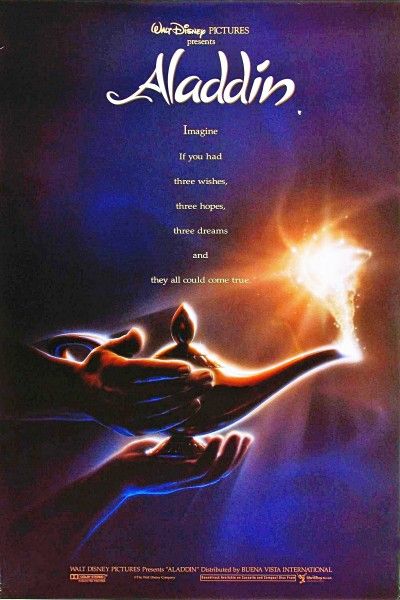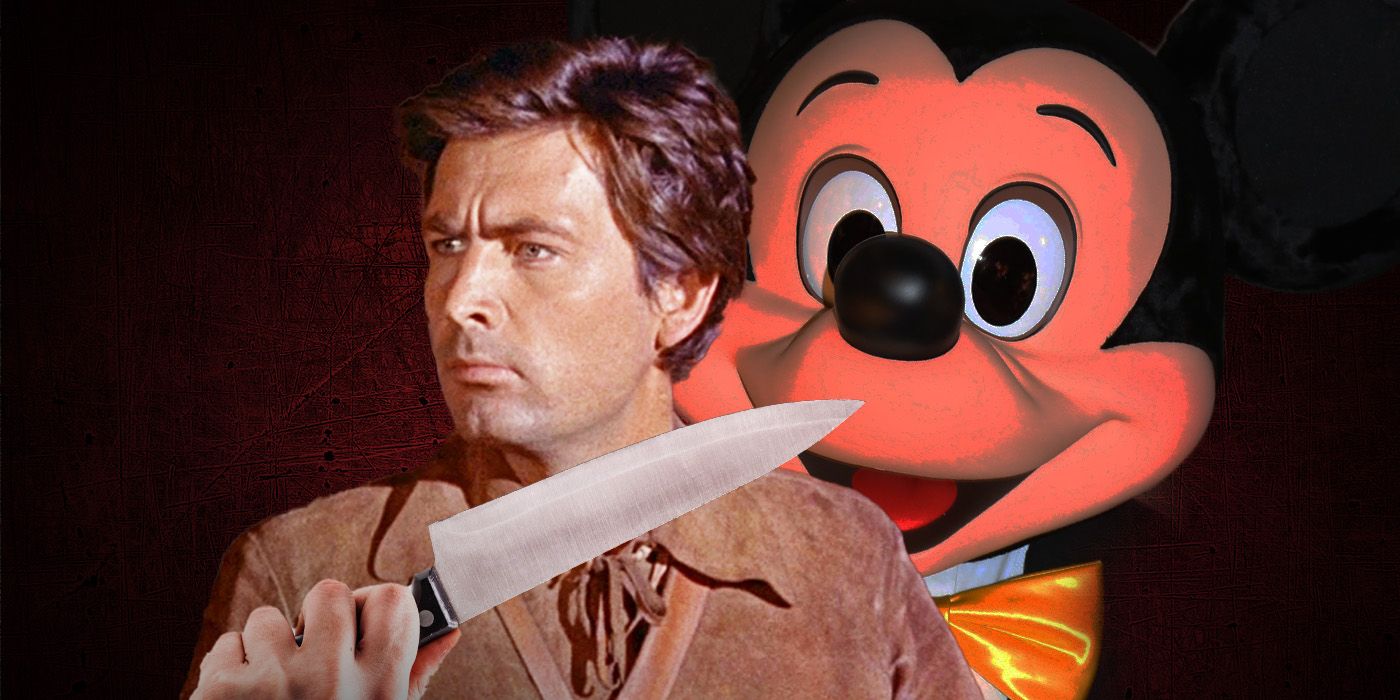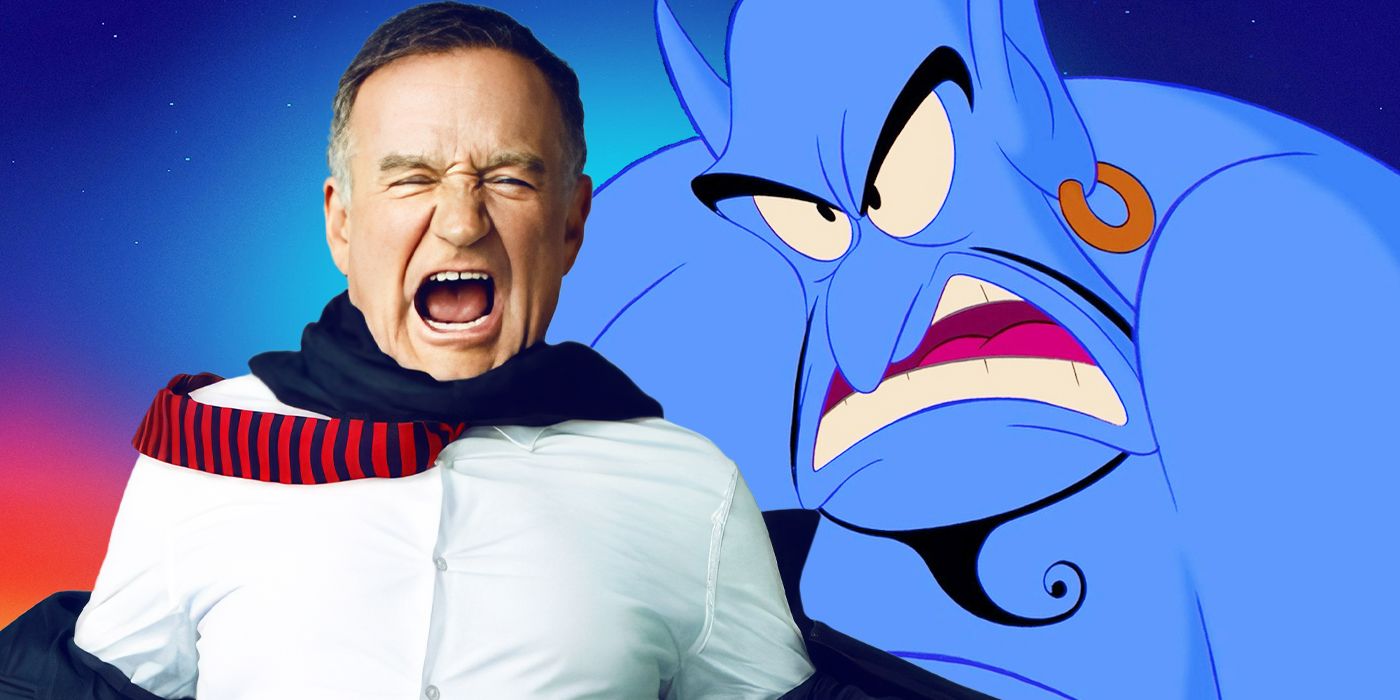The Big Picture
- Robin Williams' vocal range and comedic talent brought the Genie in Aladdin to life, stealing every scene he was in and adding an adult appeal to animated films.
- A broken agreement over merchandising led to a public feud between Disney and Robin Williams, resulting in his recasting and a sour relationship.
- Disney's new chairman eventually issued a public apology to Williams, resolving the feud and bringing him back to voice the Genie in a later Aladdin installment.
As the Genie in the 1992 classic Aladdin, Robin Williams got to let his distinct voice bounce from deep and rumbling to high-pitched as if he sucked in helium. There were impersonations of celebrities, like Jack Nicholson and Arnold Schwarzenegger. There were jokes geared toward kids and adults. This magical creature has “phenomenal cosmic powers!” while stuck in, “itty bitty living space,” and above all else, is a manifestation of the rapid-fire voices Williams could do with ease. Aladdin wouldn’t be the Disney classic it is without the vocal range of Williams. It found a whole new world of magic and music, with the Genie stealing every scene he was in. Aladdin ended up a major box office success, but a public feud soured the relationship between the Walt Disney Company and Robin Williams. The actor and comedian got furious over a broken agreement, which clouded up the skies over the sparkling castle seen in Disney’s opening logo.

Aladdin (1992)
A kind-hearted street urchin and a power-hungry Grand Vizier vie for a magic lamp that has the power to make their deepest wishes come true.
- Release Date
- November 25, 1992
- Director
- Ron Clements , John Musker
- Cast
- Scott Weinger , Robin Williams , Linda Larkin , Jonathan Freeman , Frank Welker , Gilbert Gottfried
- Runtime
- 90 min
- Main Genre
- Animation
- Studio
- Walt Disney Pictures
Robin Williams Was Perfect for 'Aladdin' — Until He Wasn’t
The Genie’s role was initially meant to be smaller in the 1992 movie. After Williams entered a recording booth, that changed. During the sessions, he recorded close to 30 hours of dialogue, both of which were written in the script and improvised. For the scene where the Genie is a bee, buzzing around Aladdin (Scott Weinger), who’s nervously trying to find the right words to say to Princess Jasmine (Linda Larkin), Williams did many takes for what the Genie could give as advice. “How do I look?” Weinger asked in behind-the-scenes footage, and Williams wastes no time in replying, “Like a vampire on a day pass.” Weinger was unable to keep a straight face and from that scene and beyond, Williams never ran out of quips or responses. The best part of Genie, overshadowed by his zippy personality, is how Williams was invested in the softer, lonelier side, where the magical being desires freedom.
Ron Clements, co-director of Aladdin, shared memories with Variety: “Each take, Robin would add and embellish, so by the 25th (and last) take, the scene had expanded (from three minutes) to about 20 minutes long! Robin kept coming up with more and more ideas. And he was consistently hilarious. At one point, we had to remove the Genie’s lead animator, Eric Goldberg, from the recording stage because his uncontrollable laughter was messing up takes.” Clements went on to add, “Hopefully we picked the best stuff, but there was a tremendous amount of strong material that didn’t make it.” And as quickly as this new collaboration started, it ended, a factor belonging to the massive collection of recorded dialogue.

Disney Killed One of Its Most Popular Characters Ever, Then Had to Bring Them Back to Life
"Davy, Davy Crockett, king of the wild frontier."In 1993, when Williams went on The Today Show to promote Mrs. Doubtfire, it was there he revealed why there was bad blood between himself and Disney. He had a strict agreement before signing onto Aladdin that he didn’t want his voice involved in merchandising. But, that is exactly what happened. Aladdin was released, became a box office juggernaut, and merchandising was a no-brainer for the Walt Disney Company. Williams accepted to be paid less for the role ($75,000 instead of $8 million) to ensure his voice wouldn’t be used to sell any kind of products. He explained, “Then all of a sudden, they release an advertisement — one part was the movie, the second part was where they used the movie to sell stuff. Not only did they use my voice, they took a character I did and overdubbed it to sell stuff. That was the one thing I said: ‘I don’t do that.’ That was the one thing where they crossed the line.” The actor and comedian wouldn't work with them again unless they apologized for their wrongdoing. “You realize when you work for Disney why the mouse has only four fingers — because he can’t pick up a check,” he stated.
Disney’s Weird "Apology" Led To Recasting the Genie
Disney claimed Williams’ comments were done out of frustration on his part due to him being unhappy with his paycheck. According to LA Times, a Disney source stated, “Every single piece of marketing material involving Robin Williams was run by Marsha (the actor’s wife) and Robin Williams.” This disagreement wasn’t going away anytime soon, meaning the Genie wasn’t going to have its voice actor, and two projects needed it: Aladdin: The Return of Jafar, Disney’s first direct-to-video animated film, and the TV show, Aladdin: The Series. Williams got recast by Dan Castellaneta, well-known for giving bumbling Homer a voice, plus many other characters on The Simpsons. Most of the original movie’s cast returned to these Aladdin follow-ups, such as Weinger, Larkin, Abu's Frank Welker, and Lago's Gilbert Gottfried. The difference in Castellaneta’s voice acting is obvious, although he replicated it as close as he could to Williams' version. His rougher vocals weren’t able to exactly mimic how Williams did high-pitched characters when the Genie transforms.
Disney chairman Jeffrey Katzenberg tried to ease tensions by sending a Picasso painting to Robin Williams, the gift valued at $1 million. That didn’t do anything as the company didn’t recognize its faults, so the painting was not an apology. He was so unmoved, New York magazine described the situation vividly, “In the Williams living room, the painting has all the charm of a fright wig, clashing with the animal cages, the children’s furniture, and the mood of the owners.” Actor Eric Idle, a friend of Williams, mentioned to him how he should make a copy of the painting to burn on TV — although that bonfire never did happen.
Disney’s lack of recognition was a disservice to what Williams provided as the Genie, with co-director Clements having mentioned in Variety, “Robin changed the way animated films were perceived. His brilliant comedy brought an adult appeal to animation that was new at the time. He was also one of the biggest stars ever to be featured in an animated film at that time. To be clear, we didn’t want Robin because he was a big star. We wanted him because he was right for the part. We wanted him because we thought his talents could bring something new and innovative to Disney animated features that could be exciting and entertaining. And he sure did!” When it seemed the feud wouldn’t be resolved amicably, there was a surprise.
How Did Robin Williams' Disney Feud End?
In 1994, Katzenberg departed from Disney, and Joe Roth, from 20th Century Fox, stepped into the role of chairman. Katzenberg’s removal was detailed in a Washington Post article, which marked his achievements in movies and TV, and where a Disney insider criticized his sudden departure, “This is fully indicative of the magnitude of disrespect and enmity that is extant in the corridors of Mousedom.” Missing from the list of Katzenberg’s achievements would be mending the feud with Williams. With Disney’s new chairman, Roth finally gave the public apology that Williams wanted and he accepted it. This brought him back as the Genie for 1996's Aladdin and the King of Thieves, the third film which would also be the series finale to the TV series. This return heralded what Clements prided on Williams’ talent of balancing family-friendly humor and jokes intended for adults. In King of Thieves, the palace is shaken as thieves cause chaos before Aladdin and Jasmine’s wedding can begin. Genie feels the rumble and blurts out, “I thought the earth wasn’t supposed to move until the honeymoon.”
In 2009, the bad blood was a thing of the past when Williams was inducted as a Disney Legend at the D23 Expo. Dan Castellaneta and Will Smith in the 2019 Aladdin remake played the Genie, each bringing their take while honoring what Williams did first. Castellaneta had it most difficult because of the recast, delivering a performance as close to the original as he could, while putting in his own flair. “You ain’t never had a friend like me!” holds true from the 1992 original during a sequence that dazzled in color and imagination. After all, the Disney icon could never be recreated, whether by another voice actor or through altered dialogue. It will always be Robin Williams who nearly had the Genie escape from the movie's 2D animation entirely.
Aladdin is available to watch on Disney+ in the U.S.

